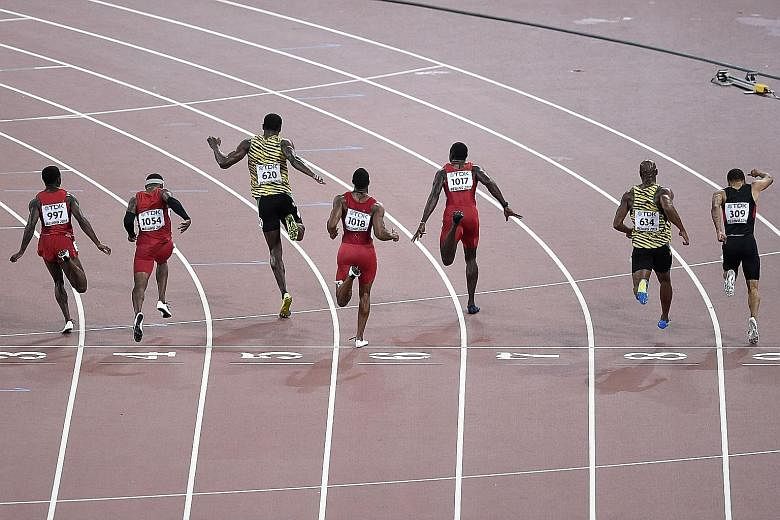Usain Bolt is evidently cooler than anyone in water. Ever seen Michael Phelps wink before a race? He is more charismatic than anyone who rides in a machine. Ever watched Lewis Hamilton grin and prance before his start? In short, Usain Bolt does fast better than anyone else.
Of course, Bolt isn't as fast as he was but he's still faster than everyone else. In the 100m, he has understandably slowed down - of his two Olympics golds and three world championship wins, his 9.79sec on Sunday was his slowest time - and he still can't be caught. His only major defeat came at the 2011 World Championships when he was disqualified for a false start. Even there, in a manner of speaking, he was faster than a gunshot.
Bolt is unforgettable for a man whom we rarely see. Lionel Messi played roughly 70 matches last season and appeared on our screens for over 100 hours. Bolt, for some people, is seen only for 10 seconds once a year at a major meet and it is enough to leave them with their collective jaw unhinged. One might say he wins athletic Oscars for doing astonishing cameos.
Bolt's allure, right from the beginning, has been that in the race of the shortest distance he won by the longest distance. In Beijing 2008, he beat the silver medallist by two metres, or 0.20sec, a gap so large that the difference in time between second place and eighth place was 0.14. He has waved, smiled, jogged and could have lit cigars on his way to finish lines.
And yet this race, won by just .01, is in some ways his greatest race because it asked for his greatest effort. It wasn't an exhibition but a contest; it wasn't a sonnet on flight but a short composition on grit. It wasn't Bolt at play but Bolt at hard work, victory not just from fast-twitch fibres but from pure nerve.
On Twitter, someone had posted an old quote from the Canadian ice-hockey star Sidney Crosby: "I don't think you're human if you don't get nervous." To which the great sprinter Michael Johnson had replied: "I agree with Sidney but it's how you handle the nerves that makes all the difference".
Bolt did it well. Justin Gatlin did not.
Bolt, 29 last week, is still a racer in the purest sense - when it matters his competitiveness flares as if his nostrils can smell an occasion and his inner afterburners light up. He stumbled in the semis but found his fastest in the finals. Gatlin had been sensational in the semis and then stumbled in the finals. The American had been faster than anyone in 28 consecutive races, except in the race he most needed to be faster.
Gatlin could have won, should have won, till his form and balance went awry in the last 20m. You might say it was the result of a mistake; one might also argue it was Bolt's aura that tripped Gatlin. An error not inadvertent but induced. This man can lift a planet to its feet and thus it is easy to believe he can make a single man lose his footing.
After the race, Gatlin smiled, he shook Bolt's hand, he left. People are allowed to dislike Gatlin, a former cheat, but perhaps their ire should be equally aimed at those who cut his ban from eight years to four. Nevertheless, this turning of a race into a glib morality tale was pitiful. "Good versus evil" seemed an overstatement of a mere 100m race - child molesters are evil, not testosterone users - and it was a narrative that was always mundane and in the end even a little mean.
Bolt anyway was not running on behalf of the planet but only to be the fastest man on it. To say he saved athletics is to mistake the intent of a man out to merely retain his reputation as a champion. On Monday morning Usain Bolt was still fast and clean and on Monday morning athletics was still a slightly shifty sport. In effect, nothing much had changed.
More drug testing, greater funding, smarter policing, stricter federations, honourable athletes - the road to a very clean sport is very long. Bolt can't do that himself, nor is it solely his responsibility.
But what he does do is distract us from the grubbiness, offering us a 10-second access pass to a wondrous world. To watch him is to consider the words of the late distance runner Steve Prefontaine, who apparently once said: "Some people create with words or with music or with a brush and paints. I like to make something beautiful when I run. I like to make people stop and say, 'I've never seen anyone run like that before'."
On Sunday night, for the first time, my brother in Devon, England and I in Singapore watched the race together, our astonishment flowing through an open phone line. On Monday morning, for the first time, I found myself looking up the talaria, the winged sandals that belonged to Hermes, the Greek god of athletics and also of travel. This, I smiled, was what Bolt somehow always does. He takes us to places we have never been before.


